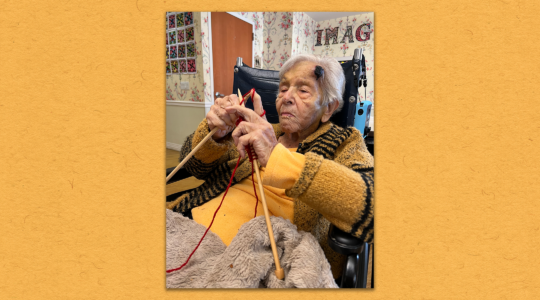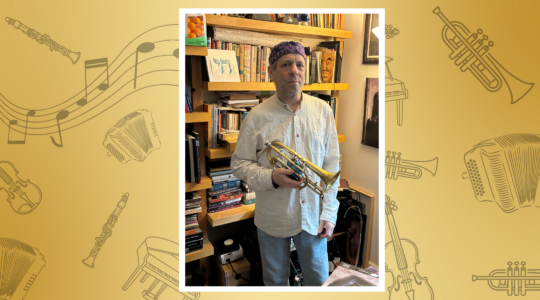How do you keep today’s Jewish teens engaged? Keep them happy, urges David Bryfman, chief innovation officer at the Jewish Education Project.
While in the past, Jewish education has stressed the transmission of knowledge, skills and literacy, that approach “no longer works,” said Bryfman. The Jewish Education Project, a nonprofit that works with Jewish educators and clergy, released a study in April highlighting that members of Gen Z — the cohort right behind millennials — prize personal happiness above all else. (The study profiled 139 teens between the ages of 12½ and 17 from four cities — Atlanta, Boston, Denver and Los Angeles.)
“Teens and millennials today are looking for more direct meaning and relevance in their lives,” Bryfman told The Jewish Week in a phone interview.
In Jewish educational settings, from day schools to Hebrew schools to youth groups, that means providing teens with practical takeaways that can improve their lives, said Aaron Dorfman, president of the Lippman Kanfer Foundation for Living Torah, a nonprofit that works to make Jewish teachings relevant to students today.
“We need to pivot away from content mastery — like does the child know the Bible stories or can s/he navigate a siddur — and focus on how the student can apply the lesson learned back to their actual life,” he said. Dorfman suggested a classroom application: Rather than learning the stories in the Book of Genesis, for example, students can use the stories in Genesis to help navigate their own sibling relationships. The biblical story of Abraham arguing with God over the fate of Sodom can teach students how to challenge authority in a respectful way.
The trend is rooted in an increased focus among educators on positive psychology, a relatively recent field founded on the belief that people can use psychological techniques to help them lead more meaningful and fulfilling lives. Today, more than 200 colleges and graduate schools in the United States offer classes on happiness and positive psychology. The introductory positive psychology class at Harvard University, taught by Israeli instructor Tal Ben-Shahar, remains the most popular class at the school, according to a recent New York Times article on happiness.
The trend has trickled down from colleges and graduate schools to high schools and day schools, said Dorfman. “If happiness is something that can be learned, Jewish educators believe it is something that can be taught,” he said.
At a recent conference, “Happiness Hacks: Feel Good, Do Good and Stop Obsessing about Jewish Identity,” the Jewish Education Project partnered with the Lippman Kanfer Foundation to teach more than 400 educators and lay leaders how to integrate positive psychology into their curricula. The conference included a lecture by renowned Israeli positive psychologist Dan Ariely and group exercises in “laughter yoga,” a series of exercises that induce laughter to promote healing.
“In the past, the purpose of Jewish education was to [allow students to] fully participate in American life without giving up their Jewish identity — now, that’s not enough,” said Aryeh Ben David, founder of Ayeka, a Jerusalem-based nonprofit that focuses on “soulful” Jewish education — teaching Jewish subjects with more “personal meaning and impact.”
“Teens today don’t need a classroom to access information — they can get anything they want to know online,” said Ben David in a phone interview. This changes the need for school “in a profound way.”
“Jewish education needs to become a vehicle to enhance students’ lives, rather than just transmit content.” Ayeka is currently working with four schools in the U.S. to train Jewish educators in “soulful education.”
Though the model is very new, Ari Schwarzberg, a high school Judaic studies teacher in Los Angeles, is making happiness a class goal using Ayeka’s approach. In the classroom, that takes the form of Schwarzberg encouraging his students to bring their own thoughts and experiences to the table. He described the new student-centric approach to education as a “significant paradigm shift.”
“Rather than assigning students to work on a project, we want to train teachers to create an educational experience,” he said. “How does learning this subject affect my own life?”
Schwarzberg, who teaches at a Modern Orthodox mixed-sex high school, said that the change is particularly challenging for Orthodox educators, many of whom place particular emphasis on mastering Jewish texts. “It’s difficult for educators to figure out a balance between skill-building/content literacy and meaningful education. … Ideally, you can integrate both into a unit. Just going through X many pages of Talmud is not working for many students.”
Schwarzberg said that so far, his students are “loving” the new approach. “Among our faculty, it’s a struggle to not let reflective conversations take up the entire period,” he said.
The new model, which speaks to the “needs of this generation,” follows the larger educational trend towards project-based learning and differentiated instruction, a framework for teaching that provides each student with a unique educational path. “What we’re seeing in Jewish education is part of a bigger picture,” said Schwarzberg.
Asked if this feel-good educational strategy simply reinforces self-serving behavioral patterns, and undercuts the communal imperative to repair the world, Bryfman said the criticism is “perfectly legitimate.”
“It’s not surprising that this generation has been labeled ‘Generation-Me,’” he said. “In this consumer culture we live in, [teenagers] have come to expect that they can pick and choose what they want to participate in — that holds true for Judaism as well.”
Bryfman argued for a pragmatic approach.
“If you are insistent on telling young people what they ought to know in order to be better Jews, that approach will not work for the vast majority of Jews out there today,” he said. While he conceded that it would be a “mistake to go all the way in the other direction and give people only what they wanted,” the real job of Jewish educators is to find “that middle ground that works — meet people where they’re at and bring them to a place closer to where we think the Jewish world would be better off.”
Andrew Paull, the senior regional director at BBYO, a leading pluralistic teen movement, said that the teens he works with in New York are so “overly focused on academics and getting into a good college” that Jewish extracurriculars need to help alleviate the stress by creating “spaces for happiness.”
“These teens are operating under tremendous pressure to achieve,” said Paull. “It is essential for Jewish youth movements to create safe, inclusive and pressure-free spaces where teens can relax. Happiness is a key part of the experience.”
Imogene Winkleman, the New York regional advisor for NFTY, the Reform Jewish youth movement, said she also sees the teens she works with operating under “intense pressure to perform.” Jewish youth groups need to provide a recess. “Happiness is both a intrinsic and instrumental value in Jewish education,” she said, picking up on a thread of discussion from the conference. When teens are happier, they share that energy with their communities, she said.
Ben Chaidell, a rabbinical student at JTS pursuing a master’s in Jewish education, suggests that the key to education for the Gen Z cohort is to tailor Jewish wisdom in a way that has practical applications.
“The big question our students are asking today is, ‘What role can Judaism play in our lives?’” said Chaidell, 27. Chaidell, who has taught in a variety of educational settings, said he hopes to be a Jewish educator for children of all ages, including teens. “We need to focus on what the takeaway can be for them. Loyalty to the past and a sense of communal responsibility are no longer motivators. The motivator is being part of a larger project that does something for you — Judaism and personal fulfillment can’t be an either/or conversation. We need to move to a both/and paradigm.”
The New York Jewish Week brings you the stories behind the headlines, keeping you connected to Jewish life in New York. Help sustain the reporting you trust by donating today.




